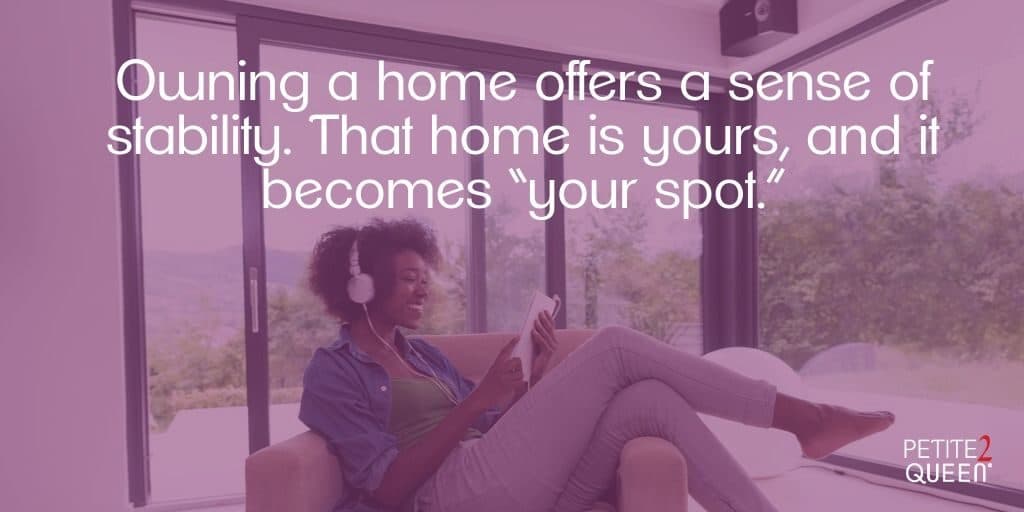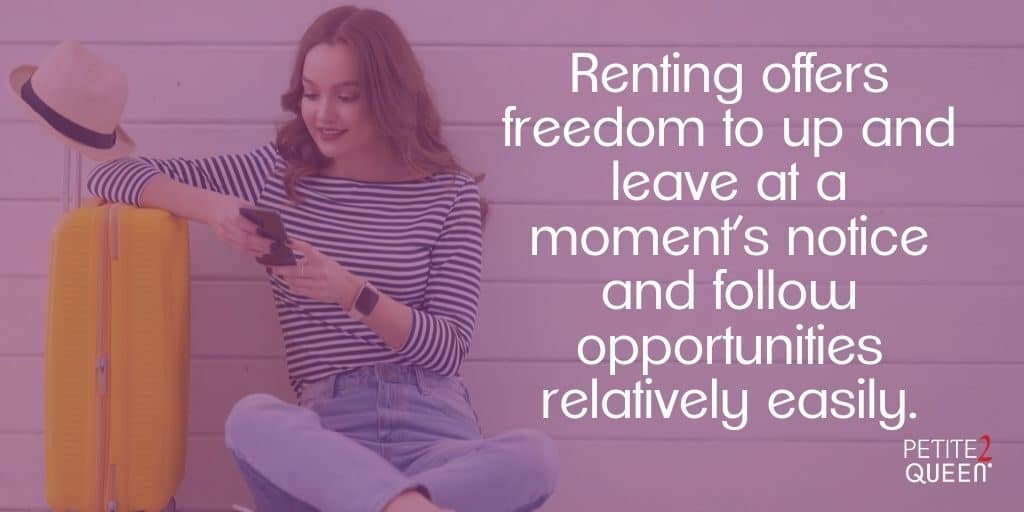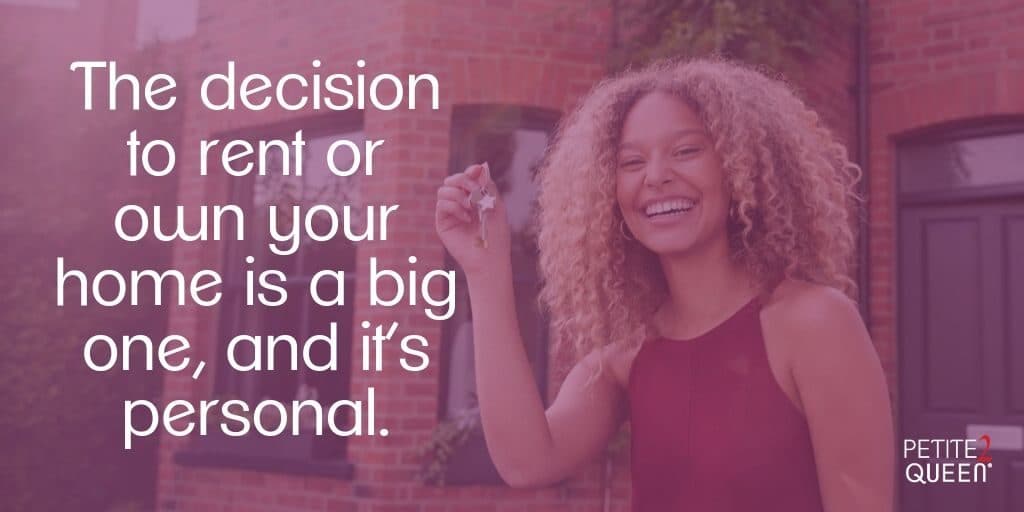My sister, Amanda, and I had an interesting conversation several months ago. She and her husband were hoping to buy a house soon (and, indeed, recently did), but I remained dubious about the prospect of owning a home. Perhaps some of this is due to coming of age during the Great Recession, haunted by the housing bubble that burst with disastrous effects, or maybe it’s because college education in America has become so expensive that I’ve been left with a mountain of debt, meaning that I may be well into middle-age by the time purchasing a home will be an option.
Maybe, however, I just didn’t like the anchoring effect a house gives. While Amanda, too, appreciates the flexibility renting afforded her, at the same time, she was tempted by the idea of the stability a bought-and-paid-for home can give. Not to mention, an owned home has resale value that a rented home doesn’t offer. So, which is better? Buying a home or remaining a renter? It’s all about which freedom matters more to you.
Being a Homeowner: The Good
The tried-and-true wisdom is to buy a house as soon as you can. As we know, owning a home has several economic advantages. After you purchase your house, as the market value of the property increases, so does your net worth. As you make payments toward your mortgage, you increase your home equity, which comes into play when you decide to sell your house. If the market value of your home has increased between your purchase and sell dates, you can make a real profit when you sell your house. What a great win!

Aside from the monetary benefits, owning a home offers a sense of stability. That home is yours. You get to return to the same home at the end of the day for years, and it becomes, in my terms, “your spot.” Owning a house can give a sense of having a home, or a place to call your own, feel safe, and get comfortable. Even before you pay off your mortgage, it is relatively difficult for you to be forced out of your home.
Owning your house also gives you freedom. That is, you are free to do with your property as you please (although homeowner associations can restrict this). You can paint your house any color, decorate its interior as you like, and design your landscaping to suit your needs and whims. You have the ability to make your home reflect who you are and best serve your needs.
Being a Homeowner: The Bad
Despite being a staple of the “American Dream,” homeownership is not without its drawbacks. Unlike with renting, you are in charge of the upkeep costs for your house. That means that when the water heater dies or the tiles are blown off your roof, you must foot the bill for the repairs. It can take decades to finally pay off your mortgage and actually own your home (instead of the bank being the owner), and, in that time, you’ll be paying interest on the home’s original cost. Bad home loans—those which the debtors could not possibly afford—were popular prior to the 2008 economic downturn, and a lack of regulation still makes them prevalent today. It takes real diligence to not fall prey to predatory lending.
While owning a home offers a lot of stability, it also acts as an anchor. If you get an opportunity to move elsewhere to follow a lucrative career, for example, you would have to spend months (or longer) getting your home ready for sale, putting it on the market, and receiving and accepting an offer. Owning a home can tie you to a specific location, potentially leaving you feeling stuck. Dreams of moving to a faraway land – another city or even country – may have to wait.

Being a Tenant: The Bad
Does this mean that renting is the better option? Being a tenant myself, I can attest that renting doesn’t provide the same sense of stability and “hominess” as owning a house. It feels like a temporary solution because you can be evicted at any time—not just through non-payment or poor behavior, but also due to things out of the renter’s control, like the landlord deciding to do major renovations or sell the house, which happened to me only a few months ago. Obviously, the tenant is given a several-months notice prior to this, but it still means needing to sort out new accommodations in short time and say goodbye to your current home.
Because you don’t own the house, you are unable to make alterations to the property without the landlord’s written permission. Don’t like the color of the bathroom? You have to check with the landlord before you can repaint it. Want new appliances? Better hope that the landlord will buy new ones! This can severely limit your ability to personalize your home.
Renting also means that you are “throwing your money away.” What I mean by this is that, unlike with paying a mortgage, paying rent does not bring you any closer to owning the home or having permanent accommodation. The monthly rent you paid is gone forever.
Being a Tenant: The Good
Being a tenant, however, does mean that you save money on home upkeep. Remember that water heater and those tiles? Your landlord is required to pay for those repairs. Sure, you might need to do some prodding, but you’ll save a good chunk of change this way. You also don’t need to pay for home insurance, although you’ll likely want to have renter’s insurance.

Finally, renting offers freedom. Not freedom to customize your house, like homeownership does, but freedom to up and leave at a moment’s notice. If you can’t wait for your lease to expire, you can simply break it and sacrifice the security deposit—usually one month’s rent. That’s a small inconvenience compared to selling a house. You can follow the opportunities that arise far more easily and move to better digs as they become available. Whether a job offer or personal desire leads you to another place, you have the flexibility and freedom to readily move without too much holding you back.
What to Do?
The decision to rent or own your home is a big one, and it’s personal. There is a myriad of factors that will influence your decision – some about you, and some about the world around you – and no blog post is going to be able to make that choice for you. Reflect on what you need from your home right now and in the near future, and go from there.
Consider what you crave more: Is it the stability of a permanent home? Perhaps the security in knowing you own something big? Or do you want the freedom to move from city to city as unique opportunities arise? Think about where you are in your life, what goals you have for the short-term and long-term, and how an owned home versus a rented home will play into that. Weigh your options carefully, determine which kind of freedom you prefer or need more, and act accordingly. Just make sure that you aren’t trying to fulfill the “American Dream” for its own sake.

Rachel Whitbeck is the Director of Communications & DEI Advisor at Petite2Queen. She has a PhD in Sociology from the University of Limerick in Ireland. Rachel uses her experience in writing, editing, and research to develop content that appeals to and is reflective of the diverse millennial woman.

